![]()
If your book club is reading any of my books and you would be interested in an author visit, you can contact me at ellenhart@earthlink.net. I'm available for book clubs in the Twin Cities, and in other parts of the country, I'm available via Skype.
PDF versions of these guides that you can print and bring to your book group are also available:
The Mortal Groove
Night Vision
The Iron Girl
An Intimate Ghost
The Cruel Ever After
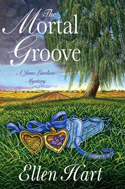 The Mortal Groove Readers' Guide
The Mortal Groove Readers' Guide
Starting Points for Discussion
1. In this mystery, Hart explores a theme of violence—how violent experience changes people. Discuss this theme in relation to both Peter Lawless and Randy Turk.
2. Early in the book, Randy talks about his loneliness as a boy and how the desire to connect with other guys his age set him on a path that he might have fled from if he'd understood where it would lead. How was loneliness complicit in Randy's demise?
3. Would you say that Larry Wilton was molded by his time in Vietnam, or do you think he would have been the same kind of man, regardless of his war-time experiences?
4. How do you think what happened to Peter in that travel trailer at the end of the book will change him?
5. Do you believe Peter was right to take Mia, or should he have left her in foster-care and tried another way to bring her home?
6. Was there redemption in this book? For any of the characters?
7. How do you think Peter's decision to take Mia will effect his future with his wife?
8. Jane is appalled by what Peter does to Larry Wilton. Do you think she should forgive him? Forget? Turn Peter into the police? How will this alter their relationship?
9. Peter is a damaged soul, looking for a way to be a hero. Larry Wilton is considered a hero by his friends because he saved their lives many times over. What is a true hero? Do we use that term too easily today?
10. In this story, some cracks begin to appear in Jane's relationship with Kenzie. Do you think they are a good match?
11. Many of the characters in this book are keeping secrets. Can you name some of them? Is not telling something you know the same as a lie?
12. In chapter sixteen Randy sweats his way through a difficult conversation with his daughter, Katie. "Randy was having a hard time looking at her. In a flash, it came to him. He was afraid of her, of her judgement. He felt suddenly old—an old man sensing how impossible it was to reduce the truth of his life to something simple enough to satisfy a child." Have you ever felt that way?
13. Hart touches on race tensions during the Vietnam era. Did her portrayal seem realistic?
14. Hart's books have been called "Cozies with a Brain." Where would you place this novel within the context of mystery fiction? Cozy/traditional? Hard-boiled? Soft-boiled?
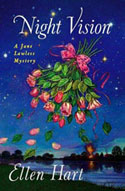 Night Vision Readers' Guide
Night Vision Readers' Guide
Joanna Kasimir, an old friend of Jane Lawless, left Minneapolis years ago to make it big in Hollywood and, unlike so many others, she succeeded. Unfortunately, her stardom came at a price. Early in her career, Joanna was involved with a man who quickly went from being an idle interest to a dangerous stalker. Nearly a decade has passed since Joanna sent him to prison, but just as she is about to leave for her hometown to star in her friend Cordelia Thorn's production of "Who's Afraid of Virginia Woolf," she receives one of his ominous calling cards.
Starting Points for Discussion
1. How would you describe Jane Lawless? Is she as easy to understand as Cordelia Thorn? Do you think that was Hart's intent?
2. Jane and David used each other as a beard in high school and college. That was over twenty years ago. Do you think this still happens today? Why? Why not?
3. Joanna has a moral dilemma. She can stay in the Twin Cities and do the show at the Allen Grimby repertory theater, fulfill her contract and her promise to Cordelia—and be stalked, fearing for her life the entire time. Or she can break the contract so that she can go off and do a movie, break her promise to one of her dearest friends—and be more or less safe from her stalker for the time she's out of the country. What would you have done?
4. Was there redemption in this book? For any of the characters?
5. American writer Flannery O'Connor defended her use of violence in fiction by saying that characters in violent situations are forced to discover their most essential selves. If that's so, what to you think Joanna learned?
6. Did you enjoy/dislike the way the past and present were woven together in this book?
7. Joanna's feelings about Gordon seem to be clear-cut throughout the novel—until the end. How would you describe Joanna's character? How did she really feel about Gordon?
8. Virtually all film stars have stalkers. It's just a question of how many, how determined, and how disturbed they are. Is the price of fame worth it?
9. What can Cordelia do to get Hattie back? What do you think she will do?
10. Why do you think Joanna was so attracted to people who talked down to her? For example, Faye and Gordon.
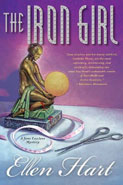 The Iron Girl Readers' Guide
The Iron Girl Readers' Guide
After years spent mourning the death of her partner, Christine Kane, Minneapolis restaurateur Jane Lawless is moving on. Sorting through the boxes of Christine's belongings, she is shocked to discover a gun. Before her illness, Christine, a real estate agent, was selling a house for the Simoneau family. The night before her death, three family members were murdered. Jane always assumed Christine knew nothing of their family secrets, but the gun suggests otherwise. As Jane searches for clues to understand what really happened to Christine those many years ago, her pursuit leads her deep into a confrontation with danger and a painful past.
Starting Points for Discussion
1. Agatha Christie wrote in her autobiography about her dislike of mysteries having a romantic subplot. Do you agree with her views? Did you feel the romantic elements in this book enhanced or detracted from the story?
2. Doubling/duality is a major theme in the novel. Hart uses two alternating narratives, following Jane in the present and Christine in the past. The sculpture featured in the title is also a double: lost and then found, it's image suggests that of the face Christine shares with Greta. What did you think of this thematic use of duality? Can you think of other examples?
3. Do you think Bernadette Simoneau made a good mother to her son, Philip?
4. If you came face to face with the spitting image of a lost love, one who wanted to get to know you, how would you react?
5. How does Hart use the dog, Mouse, in the book? (Confidant? Humor? Protector?)
6. "I almost killed a man today. You can't know how much that appalls me. But there's something that appalls me even more. I liked the feeling of the gun in my hand. It was this amazing high. Do you have any idea how terrified I am by that?" Jane tells this to Cordelia after finding Greta in the hotel room with Calvin. Did you think she would kill him? Will this revelation change her? Do you think she will be more likely to pick a gun up again? Less likely?
7. How does the Edith Wharton quote at the front of the book help to shape your understanding of the story?
8. How did Hart conceal/reveal the nature of the villain in this story?
9. Would you dress up in 20's costumes and visit the Xanadu Club for an evening of dinner and dancing? Do you think this kind of restaurant could make a go of it?
10. If The Iron Girl were made into a movie, what actors can you see playing Jane and Cordelia, Bernadette and Laurent? Christine?
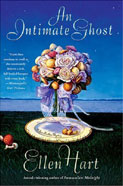 An Intimate Ghost Readers' Guide
An Intimate Ghost Readers' Guide
Restaurateur Jane Lawless is thrilled to be catering the wedding of some family friends, Nick and Lauren Clifford, but when Jane arrives at the reception, she's in for a shock of a lifetime—and one that could jeopardize her career. The food has been spiked with hallucinogenic mushrooms and the drug-hazed guests are engaged in dangerously reckless behavior. Events take a turn for the worse when the father of the groom comes up against shocking accusations. Once again, Ellen Hart has woven intriguing characters and surprising twists into a complex and absorbing story.
Starting Points for Discussion
1. What is the most important part of a mystery to each reader? Character, action, dialogue, plot, suspense? How does this book rate in each area?
2. Hart used sections of Jimmy Shore's story throughout the book. Did you find that an effective way to create a backstory?
3. In what ways do Jane and Cordelia's personalities complement each other?
4. What do you think might have happened to Patsy Shore after she was abducted?
5. "Ever since the day Cullen Hegg had died, people had called Alden a hero, said his actions had helped to avert an even greater tragedy." Do you think we use the term "hero" too freely today?
6. Cordelia thinks that she and her sister, Octavia, are polar opposites. Jane once remarked that they were "two peas in a very strange pod." What do you think?
7. What was Burt Hegg's fatal flaw as a father?
8. Do you think Jane should have trusted Kenzie?
9. What was your reaction to Alden? Did you find him sympathetic, manipulative, tortured, evil, a victim, a victimizer?
10. Did you find any clues to Hart's world view within the story? What were the themes Hart was working with?
11. Could you predict who Jimmy Shore was in the main story? How early? Did you know what the ending would be?
12. How important is humor in a mystery novel?
13. Do you prefer happy endings in crime fiction?
14. Is this novel a cozy? (For those who are unsure, agree on a definition of a cozy, and then review some of the scenes.)
The Cruel Ever After Readers' Guide
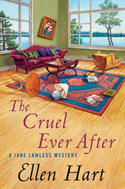 The shock that Minneapolis restauranteur Jane Lawless is in for when Chester Garrity returns to a city that he swore he'd never see again is nothing compared to Chester's own. He's currently penniless, or as he would prefer to say, between fortunes. He's working an angle to make his next one by selling a priceless artifact recently looted from the Baghdad Museum, but it all falls through when he wakes up next to the dead body of his buyer with no memory of what happened the night before. Panicked, Chester flees the scene, eventually returning to cover his tracks only to find that someone has already taken care of that for him. But at what price?
The shock that Minneapolis restauranteur Jane Lawless is in for when Chester Garrity returns to a city that he swore he'd never see again is nothing compared to Chester's own. He's currently penniless, or as he would prefer to say, between fortunes. He's working an angle to make his next one by selling a priceless artifact recently looted from the Baghdad Museum, but it all falls through when he wakes up next to the dead body of his buyer with no memory of what happened the night before. Panicked, Chester flees the scene, eventually returning to cover his tracks only to find that someone has already taken care of that for him. But at what price?
Starting Points for Discussion
1. In this mystery, Hart offers several different examples of the aftermath of a once-solid love relationship. Discuss this in relation to Irina and her husband, Steve. Irina and her relationship with Chess. Jane and Julia. And though not a true marriage, Jane and her affection for Chess. Are all of these part of the thread of "the cruel ever after"?
2. Do you feel that Jane was too gullible when she married Chess? Were her reasons honorable, or were they mostly financial? What would you have done given the same set of circumstances?
3. In the book, Chess muses on his connection to ancient antiquity. He thinks to himself, "Going backward in time had always appealed to him far more than going forward. All his curiosity centered on the ancient, which was science fiction enough." How did this factor in to his ultimate demise?
4. Julia Martinsen is a manipulator. She's also a doctor, who wants to help the sick, the poor, the needy. Can a person be both? Is she more good or bad?
5. Julia believes in fate, when it comes to romantic affairs. She thinks she and Jane are fated to be together. Do you think she and Jane will ever get together again? Does Jane have anything to fear from Julia?
6. Many of the characters in this book are keeping secrets. Can you name some of them? Is not telling the truth the same as a lie?
7. A number of comments in the book point to the question of who owns ancient antiquities. When Chess give Jane a Roman snake ring from the second century B.C.E, he says, "I wore it for a while. Now I'm passing it on to you. It's just stuff, Jane. Old stuff, for sure, but stuff nonetheless. Nobody owns an antiquity. It just gets passed around." Jane later discovers this: "Most reputable museums actually own stolen artifacts. The concept of 'provenance' appears to be tricky—and murky—when you're dealing with something that ancient. Museums are generally wary of tighter laws because they feel those laws would drive art antiquities underground—into the hands of private collectors. Cultural sensitivity notwithstanding, the black market is apparently booming." So who owns these ancient artifacts? Who owns the Winged Bull of Nimrud? The Iraqi people? The museum it might end up in one day?
8. Do you think Jane will ever accept Nolan's offer to come work with him and get her own P.I. license?
9. As a seasoned mystery reader, you probably knew Lee, the preacher, wasn't entirely on the up and up. Did you peg him as one of the cabal? If so, when in the book?
10. Jane's family and friends are important to her. Her father, her brother and his wife, her niece, Cordelia, and Cordelia's niece... and now, Nolan. Some of these people were part of the early books. Some are new. How does Jane's love of her family and friends, and her commitment to them, shape her character?
11. How will the abduction of Peter and Sigrid's daughter, Mia, change their relationship? Or will it have no effect at all?
12. If The Cruel Ever After were made into a movie, who would play Jane? Cordelia? Chess? Irina? Julia? Nolan?
© Ellen Hart.

